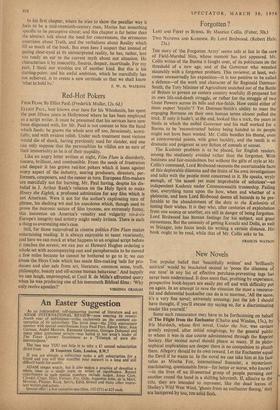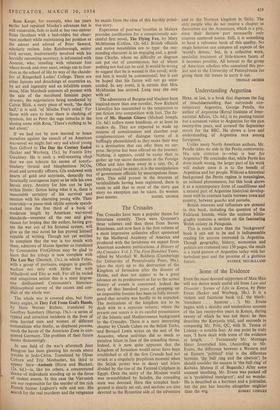New Novels THE popular belief that 'beautifully written' and 'brilliantly
satirical' would be bracketed second to 'poses the dilemma of our time' in any list of effective purchase-preventing tags has never been undermined. It does seem that, profiting by experience, prospective book-buyers are easily put off and with difficulty put on again. In an attempt to save the situation the most a resource- ful and deferential bookseller can do is to murmur, 'All the same, it's a very fine novel; extremely amusing; just the job I should have thought, if you'll excuse my saying so, for a discriminating reader like yourself.' Some such reassurance may have to be forthcoming on behalf of The Flight from the Enchanter (Chatto and Windus, 15s.), by Iris Murdoch, whose first novel, Under the Net, was caviare greatly enjoyed, after initial misgivings, by the general public to whom it was in due course administered through the Reprint Society. Her second novel should please as many. If its philo- sophical implications are deeper there is no compulsion to plumb them. Allegory should be its own reward. Let the Enchanter equal the Devil if he wants to. In the novel we can take him at his face value as Mischa Fox, international financier, a mysterious, machinating, questionable force—for better or worse, who knows? —in the lives of an ill-assorted group of people pursuing one another round the bend in a shifting labyrinth. lf, allusive to the title, they are intended to represent, like the dead leaves of Shelley's Wild West Wind, 'ghosts from an enchanter fleeing,' they are hampered by too, too solid flesh. Rosa Keepe, for example, who ten years earlier had repulsed Mischa's advances but is still vulnerable, fails to hold at bay two sinister Poles (brothers with a bed-ridden but obser- vant mother) while maintaining her position as the adorer and adored of Peter Saward, scholarly recluse. John Rainborough, senior civil servant, inadvertently involved with his horridly oncoming secretary, is infatuated with Annette, who, standing with reluctant feet where brook and river meet, swings out to free- dom in the school of life by way of the chande- lier of Ringenhall Ladies' College. There are other liaisons and detachings of eccentrics as, by art and ingenuity and an infallible comic sense, Miss Murdoch connects all present with the sale of the moribund feminist paper Artemis, the negotiations being conducted by Calvin Blick, a nasty piece of work, 'the dark half,' it is said, 'of Mischa Fox's mind.' For those with ears to hear there is clashing of symbols, but as Peter the sage remarks in the closing scene with Rosa, 'There's clothing to be sad about.
If we .had not by now learned to brace ourselves against the assault of an American War-novel we might feel very sad about young Sam Gifford in The Day the Century Ended (Seeker and Warburg, 15s.), by Francis Irby Gwaltney. He is such a well-meaning chap that we can tolerate his excess of sonofa- bitchery (brutal and blasphemous ' NCOs, cruel and cowardly officers, GIs endowed with hearts of gold and satyriasis, dastardly but fanatically courageous Japs) as he tells his own heroic story. Anxiety for him can be kept within limits: fiction being what it is, there is reasonable certainty of his survival and reunion with his charming young wife. Their courtship—a peace-time idyllic episode spatch- cocked into the first third of a book of moderate length by American war-novel standards—sweetens all the rest and gives reason for hoping that the author, having got- ten the war out of his fictional system, will give us the real novel he has proved himself capable of writing. Though not yet entitled to complain that the war is too much with them, admirers of Manes Sperber as translated by Constantine FitzGibbon may be glad to learn that his trilogy is now complete with The Lost Bay (Deutsch, 15s.), in which Faber, with a group of partisans, engages in guerilla warfare not only with Hitler but with Mihailovid and Tito as well. For all its varied and ubiquitous action this is a most impres- sive disillusioned Communist's historico- philosophical survey of the causes and con- duCt of the whole war.
The whole war is covered also, but from many angles, in They Fell From God's Hands, by Hans Werner Richter, translated by Geoffrey Sainsbury (Harrap, 15s.)—a series of typical and atrocious incidents in the lives of nine harried men and women of different nationalities who finally, as displaced persons, reach the haven of the American Zone in con- quered Germany. The problem of their future looms threateningly.
In one field of the war's aftermath Jean Hougron has been gleaning his novels about trouble in Indo-China. Translated by Oliver Coburn and Eric Mosbacher, his third to appear here—Ambush (Hurst and Blackett, 12s, 6d.)—is, like his others, a concentrated
1v drama of individuals standing up to the force of violent events. In, this case the Viet-minh are not responsible for the murder of the rich French farmer Leghorn's wife and son. His search for the real murderer and the vengeance he exacts form the don of this harshly primi- tive story.
Experience of post-war troubles in Malaya provides justification for a conspicuously suc- cessful first novel, The Flying Fox, by Mary McMinnies (Collins, 12s. 6d.). British officials and native notabilities are to type: the out- standing character is an engaging cad, a good- time Charlie, whom no difficulty or disgrace can put out of countenance, but of whom nothing not bad can be said. It would be wrong to suggest that he is wasted in this novel; with- out him it would be conventional; but it can be hoped that his future will not go unre- corded. In any event, it is certain that Mrs. McMinnies has arrived. Long may she stay with usl
The adventures of Burgess and Maclean have inspired more than one novelist. Now Richard Llewellyn has succumbed to the temptation to put fiction into competition with fact. The fic- tion of Mr. Hamish Gleave (Michael Joseph, 12s. 6d.) suffers some handicap, or at least its readers do. They are expected to wade up streams of consciousness and clamber over conglomerations of dialogue (some of it bafflingly phoneticised) as they make their way to a destination that can offer them no sur- prise. Surprise has been offered on the journey. Nothing, it appears, could be easier than to gather up top secret documents at the Foreign Office and take them away in a taxi. Or, if anything could be easier, it is the manipulation of government officials by unscrupulous finan- ciers. This mild protest in the interests of verisimilitude having been registered, there is room to add that to most of the story qua story no exception can be taken. Its women



































 Previous page
Previous page